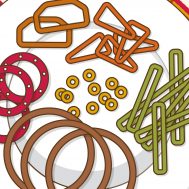Food processing equipment heavily relies on rubber elastomers to maintain their safety, hygiene, and efficiency. These versatile materials play a role in just about every aspect of food and beverage production, serving as essential components in seals, gaskets, and other rubber applications.
FDA Compliance and Food Safety
In food processing applications, rubber elastomers must meet strict FDA requirements. Materials like silicone, EPDM, and nitrile rubber are specifically formulated to:
- Resist bacterial growth
- Maintain stability across temperature extremes
- Prevent contamination
- Withstand regular cleaning and sterilization
Key Applications in Food Processing
Sealing Solutions
Food-grade rubber elastomers are essential for creating reliable seals in:
- Pump housings
- Pipeline connections
- Storage tank access points
- Mixing vessel components
Critical Properties
Modern food processing elastomers deliver:
- Temperature resistance from -40°F to 400°F
- Chemical compatibility with cleaning agents
- Excellent compression set resistance
- Low particle shedding
Maintenance and Longevity
Regular inspection and replacement of rubber components help ensure:
- Consistent product quality
- Compliance with food safety regulations
- Prevention of contamination risks
- Extended equipment life
The right rubber elastomer selection is crucial for food processing operations. Working with experienced manufacturers helps ensure that you make the best material selection for your specific applications, leading to improved efficiency and safer food products.
For more information about food-grade rubber elastomers and custom solutions for your processing equipment, contact Apple Rubber’s engineering team.
